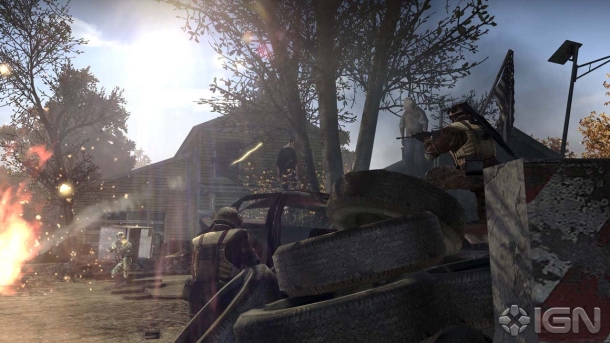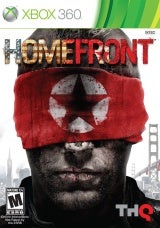Homefront is a modern (by which I mean "oppressively linear and highly scripted") FPS stripped of all pretense; glaring flaws remain out in the open, unhidden by the clever craftsmanship that saves similarly structured games like Medal of Honor. Homefront is the logical conclusion of the rapidly tiring Call of Duty-clone formula: The drama is more overly dramatic, the scripting more opaque and easily broken, the idea-swiping more blatant, the storyline more absurd, and the expectations of player ability lower than ever. Had developer Kaos Studios tossed in some jokes, Homefront would be a slightly more subtle parody than Epic Games' Duty Calls. Instead, it's an FPS meant for a budding Idiocracy.
But how can we blame the creators? They're just players in the profit-maximization game, and you probably know the old adage: Don't hate the player. This is the FPS we keep buying, the design we continue to accept as the status quo. This game, where enemies are either wholly unaware of your existence or laser-focused on your every exposed pixel, and blatantly spawn ad infinitum until a script tells them to stop. This game, where players are considered too unreliable or too unskilled to directly control a vehicle -- the Goliath -- and are instead given a boring target designator to point the heavy hardware where it needs to fire, while the war machine itself scoots along a preset path. This game, where a cadre of predictably archetypal companions (vaguely ethnic chick and hard-chargin' high-and-tight hardass, you say?) exist solely to shuttle you in and out of doors on a developer-set schedule. This is what the FPS has been reduced to.

The only level in which Kaos leverages their history as a Battlefield 1942 mod team (and, consequently, the only level that's fun) involves protecting a moving gas tanker convoy from the cockpit of a fully player-controlled chopper. But even here, Kaos can't help but remind you that you're just a spectator in what amounts to a marginally interactive Disney attraction: The invisible tether that ties you to the convoy is roughly 20 feet long, meaning that your entire time in the air is set to the pleasant sound of a screeching klaxon; too long outside the acceptable zone, and its reload time. Warning Fun detected. Please return to Homefront.
Even multiplayer (note: I played the PC version) is stricken with the blight of the modern shooter. Taking a cue from, well, every multiplayer FPS in recent memory, Homefront snipers -- equipped out-of-the-gate with semi-automatic, no recoil, no scope-sway, one-shot-one-kill rifles with no range limitation and gravity-defying rounds -- dominate with impunity. Add to this the fact that the squad system does literally nothing, as far as my friends and I could tell, and Kaos has created yet another ostensibly team-based shooter that provides powerful incentives to go it alone. Too bad, really, since the Battlepoints system (kills rack up a Battlepoint currency, which you can cash in on ordnance or vehicles) is a decent enough solution to the longstanding problem of vehicle saturation in Battlefield-type games.
The most intensely absurd moment I experienced in Homefront occurred when -- shortly after finishing the requisite dull sniper mission, but slightly before the knockoff AC130 section -- I hopped in a chopper with some American military grunts. The pilot yelled "I hope y'all don't mind some music," and the 1966 hit "Time Has Come Today" began playing. The song lasted for all of 15 seconds before the next Very Dramatic Event triggered some appropriately ominous music. This was perhaps the most bewildering moment of rote game design that I've ever encountered: Was the music supposed to excite me? Was I supposed to gear up for the coming fight? Doubtful, it came and went almost before I could identify it. Nah, that scene exists for the same reason that so many of Homefront's sections exist: Someone else made money on them first.





 Fair
Fair


